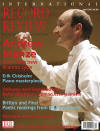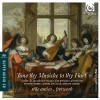Texte paru dans: / Appeared in:
*

International Record Review - (04/2012)
Pour
s'abonner / Subscription information
Harmonia Mundi
HMU807554

0093046755461
Consultez toutes les évaluations recensées pour ce cd
~~~~ Reach all the evaluations located for this CD
With this disc, Stile Antico leaves aside its usual repertoire of sixteenth-century liturgical polyphony intended for the great cathedrals and the chapels of the royal and great noble courts, most of it Catholic and in Latin, and turns to non-liturgical devotional music of the Tudor and Jacobean periods, most of it Protestant and all of it in English. The programme encompasses a broad period, from the pre-Reformation John Browne, who was active between 1480 and 1505 , to John Amner, Robert Ramsey and Thomas Tomkins, who died in 1641, 1644 and 1656 respectively. Another difference from Stile Antico’s previous recordings is that for the first time it is not alone: it is joined by the viol consort Fretwork in three of the vocal works, which also contributes three purely instrumental In nomine settings by John Taverner and Robert Parsons.
Although Matthew O ‘Donovan, one of Stule Antico’s basses, contends in his booklet notes that the level of musical literacy in England throughout the sixteenth century was very high and domestic singing became increasingly popular among the middle classes as the century progressed, most of the music on this disc appears to have been intended for liturgical use and requires singers of a very high level of skill. The first work, O praise the Lord by Thomas Tomkins, written in exciting 1 2-voice, constantly cascading polyphony, is suitable only for a well-drilled choir and many of the other works are only a little less demanding. Very few pieces are metrical psalms or simple polyphonic hymns of the kind one would imagine was the standard fare of a middle-class domestic musical ensemble in Protestant England. In fact, the one work in the programme that is performed like a metrical psalm is the Catholic Thomas Campion’s lovely song Never weather-beaten sail. Stile Antico’s bland, rather Oxbridge style harmonized version is one of the disc’s disappointments.
Byrd’s lament on the grisly execution of the Catholic martyr Edmund Campion in 1581 which follows it is performed as originally written as a consort song for tenor and viols. Both the Campion and Byrd, together with John Dowland’s I shame at my unworthiness, were clearly suited to domestic use, but a significant proportion of the works in the programme were for church , even if some of them appeared in printed collections. The two works by Amner, which are in a modern style influenced by the seconda prattica of early Baroque Italy (but still without basso continuo), were intended for services at Ely Cathedral. The first, the Christmas verse anthem O ye little flock, which dates from about 1615 , contrasts full choral sections with passages for concertante voices, which are unfortunately marred by some wobbly singing by the solo alto.
Overall, however, the performances display Stile Antico’s customary tight discipline, refined blend and expressively pliable tone and phrasing. These qualities are well suited to the more madrigal-like pieces that arc not the group’s usual material, such as the Dowland and Giovanni Croce’s doleful six- voice Italian setting of Psalm 130 in the ‘newly Englished’ version published by Thomas East in 1608 . Fretwork’s finely nuanced viol consort pieces complement the choir nicely. (Incidentally, this was Fretwork’s last recording with its tenor viol player, Richard Campbell, before his untimely death in March 2011.)
Stile Antico has the distinction of being the only Renaissance choir all of whose discs, to my knowledge, have been issued as SACDs, which, while being playable as conventional CDs, also incorporate separate versions of the recording in high-resolution DSD format (both multi-channel and stereo) that are playable only on a dedicated SACD player or a so-called universal player with SACD capability. SACDs have a transparently clear sound of great immediacy that is ideal for chamber choirs and viol ensembles. This disc is no exception. Yet, even on a standard CD player its sound-engineering is outstanding.
Even so, to those familiar with Stile
Antico’s previous brilliantly executed recordings of brilliantly conceived
liturgical polyphony, much of this disc may still seem a little dull.
Fermer la fenêtre/Close window
Cliquez l'un ou l'autre
bouton pour découvrir bien d'autres critiques de CD
Click either button for many other reviews


